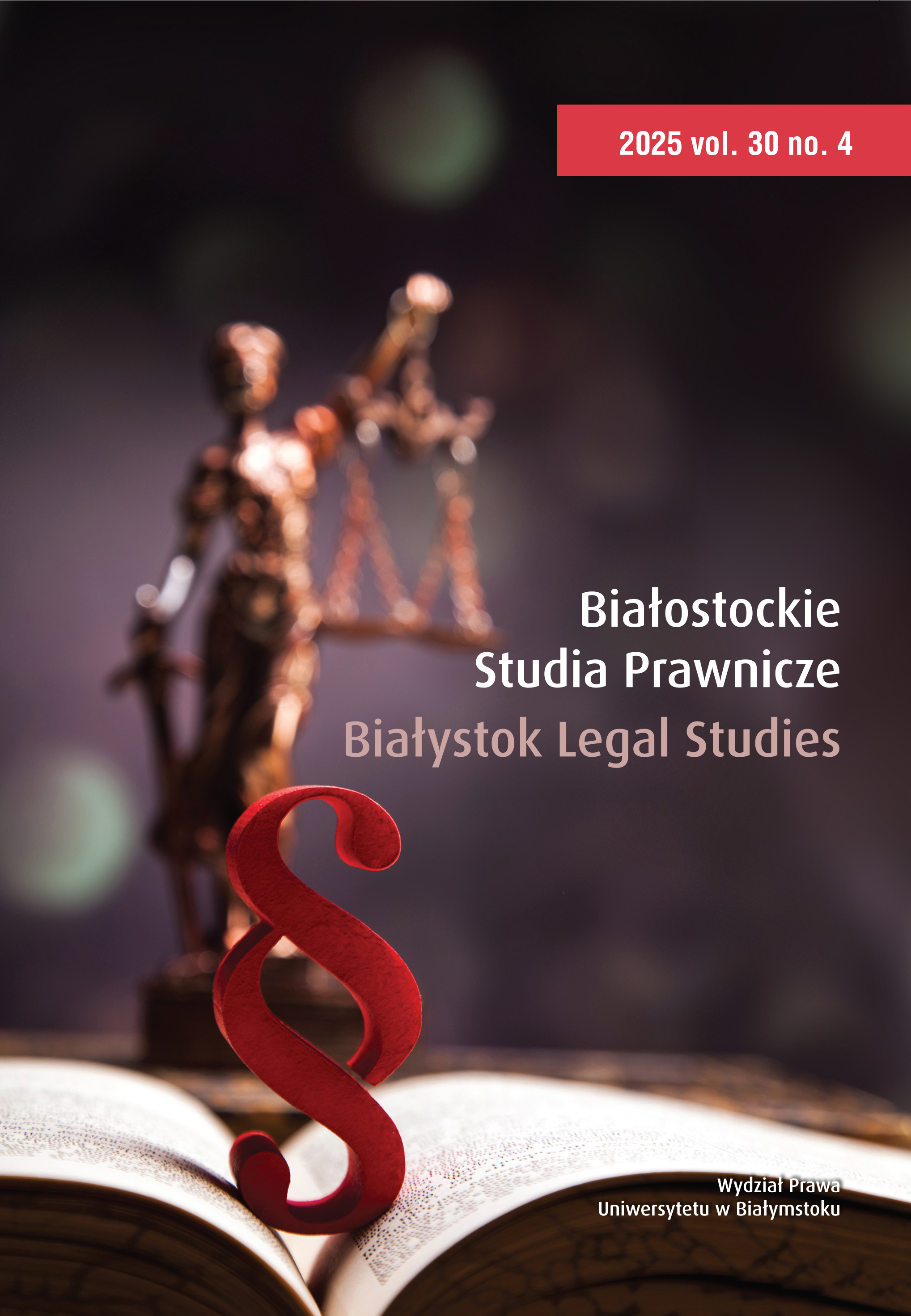The Constitutionalization of the Internet and the Right to Non-Use
Abstract
The author discusses the phenomenon of non-use, defined as a conscious refusal to use the internet, and its constitutional justification. She defends the thesis according to which an individual’s decision not to use the internet, and thus electronic communication, may have a constitutional background. It is also discussed that the traditionally understood principle of freedom of form should not be subject to an exception that makes the effectiveness of administrative proceedings dependent on their performance electronically, especially through an ICT system. This constitutionally guaranteed right cannot be hindered by a lack of or deficiency in the necessary statutory regulations. The introduction of a procedural regulation about the right not to use the internet within the laws on administrative and tax proceedings is postulated.References
All 4 Comms. (2024, 24 April). Social media in Poland – marketing statistics to know in 2024. https://all-4comms.com/social-media-in-poland-marketing-statistics-to-know-in-2024 (URL)
Batko, K., & Billewicz, G. (2013). E-usługi w biznesie i administracji publicznej. Studia Ekonomiczne, 136, pp. 47–63;.
Belpomme, D., & Irigaray, P. (2020). Electrohypersensitivity as a newly identified and characterized neurologic pathological disorder: How to diagnose, treat, and prevent it. International Journal of Molecular Sciences, 21, 1–20.
de Gregorio, G. (2022). Digital constitutionalism in Europe: Reframing rights and powers in the algorithmic society. Cambridge University Press.
Dudek, M. (2023). Administracyjne postępowanie uproszczone. C.H. Beck.
European Council and European Parliament. (2013, 9 October). Regulation Establishing the Union Customs Code ((EU) 2013/679) (Journal of Laws, UE L.2013.269.1).
European Parliament. (2014, 23 July). Regulation (EC) no. 910/2014 of the European Parliament and of the Council of 23 July 2014 on Electronic Identification and Trust Services for Electronic Transactions in the Internal Market and Repealing Directive 1999/93/EC (Journal of Laws, UE L.2014.257.73).
European Parliament. (2016, 26 October). Directive (EU) no. 2016/2102 of the European Parliament and of the Council of 26 October 2016 on the Accessibility of Websites and Mobile Applications of Public Sector Bodies (Journal of Laws, UE L.2016.327.1).
European Parliament. (2021, 29 April). Regulation (EU) no. 2021/694 of the European Parliament and of the Council of 29 April 2021 Establishing the Digital Europe Programme and Repealing Decision (EU) 2015/2240 (O. J. EU L.2021.166.1).
European Parliament. (2024, 13 March). Regulation (EU) no. 2024/903 of the European Parliament and of the Council of 13 March 2024 Establishing Measures for a High Level of Public Sector Interoperability Within the Union (Interoperable Europe Act) (Journal of Laws, UE L.2024.903).
Gov.pl. (2023, 29 November). Największy wyciek danych medycznych w Polsce. Sprawdź, czy Twoje dane też wykradziono. https://www.gov.pl/web/baza-wiedzy/najwiekszy-wyciek-danych-medycznych-w-polsce-sprawdz-czy-twoje-dane-tez-wykradziono
Helsper, E. J., & Reisdorf, B. C. (2013). A quantitative examination of explanations for reasons for internet nonuse. Cyberpsychology, Behaviour, and Social Networking, 2, pp. 94–99.
Holtgrewe, U. (2014), New new technologies: The future and the present of work in information and communication technology. New Technology, Work & Employment, 29(1), 9–24.
Jałowiecka, A. (2023). Wyciek danych z systemu teleinformatycznego na przykładzie działalności wybranych organów administracji publicznej. Prawo Mediów Elektronicznych, 1, 4–11.
Jamart, A. C. (2014), Internet freedom and the constitutionalization of internet governance iIn R. Radu, J.-M. Chenou, & R.H. Weber (Eds.), Evolution of Global Internet Governance. Principles and Policies in the Making (pp. 57–76). Heidelberg: Springer. https://doi.org/10.1007/978–3-642–45299-4_4
Judgment of the Constitutional Tribunal of 9 June 1998, K 28/97.
Judgment of the Constitutional Tribunal of 10 July 2000, SK 12/99.
Judgment of the Supreme Administrative Court of 22 January 2025, I GSK 1042/21.
Kappeler, K. Festic, N., & Lanzer, M. (2020). Who remains offline and why? Growing social stratification of internet use in the highly digitized Swiss society. Media Change & Innovation, 10. pp. 1–30
Kemp, S. (2024, 23 February). Digital 2024: Poland. DataReportal. https://datareportal.com/reports/digital-2024-poland (URL)
Kettermann, M. C. (2020). The normative order of the internet: A theory of rule and regulation online. Oxford University Press.
Kloza, D. (2024). The right not to use the internet. Computer Law & Security Review: The International Journal of Technology Law & Practice, 52.
Koenig C. Vorlesung allgemeines Verwaltungsrechteinschließlich Verwaltungsprozessrecht. https://www.docsity.com/de/docs/skript-allgemeines-verwaltungsrecht-mit-verwaltungsprozessrecht-teil-verwaltungsverfahrensrecht/5730371/, pp. 13–32.
Konieczna, K. (2024). Miejsce powstania szkody jako podstawa jurysdykcji szczególnej dla roszczeń o naprawienie szkody doznanej w związku z rozpowszechnianiem w Internecie dyskredytujących wypowiedzi. Gdańskie Studia Prawnicze, 3. Pp. 189–200
Lessing, L. (2006). Code Version 2.0. http://www.codev2.cc/download+remix/Lessig-Codev2.pdf
Mayer, F. C. (2001). Review essay: The internet and public international law – worlds apart? European Journal of International Law, 12, 617–622.
Minister of Digitalization and Connection Institute. (2024). Polska w zasięgu stacjonarnego dostępu do internetu. https://www.gov.pl/web/cyfryzacja/juz-jest-sprawdz-nowy-raport-polska-w-zasiegu-z-danymi-z-internetgovpl
Perritt, H. H. (2000). The internet is changing the public international legal system. Kentucky Law Journal, [VOLUME 88], 2–50.
Petrosyan, A. (2024, 4 March). Share of individuals using the internet in the United Kingdom (UK) from 2002–2024. Statista. https://www.statista.com/statistics/1124328/internet-penetration-uk
Podgórecki, A. (1962). Charakterystyka nauk praktycznych. PWN.
Radu, R., Chenou J.-M., & Weber, R. H. (2014). The evolution of global internet governance principles and policies in the making. Springer.
Rarot, H., & Wójcik, T. (2023). Kryzys informacyjny i milczenie w perspektywie filozoficzno-kulturowej. Kultura i Wartości, 35, 59–79.
Romaniuk, P. (2019. Wyzwania stawiane administracji publicznej w zakresie rozwoju e-usług. In Z. Duniewska & Rabiega (Eds.), Standardy współczesnej administracji i prawa administracyjnego (pp. 271–282).
Rööslia, M., Mohlera, E., & Frei, P. (2010). Sense and sensibility in the context of radiofrequency electromagnetic field exposure. Comptes rendus physique, 11, 576–584.
Sas, A. (2025, 19 June). Number of internet users in Poland from 2016 to 2024. Statista. https://www.statista.com/statistics/955204/poland-internet-users, pp. 1 – 55
Schwöbel Ch (2011), Global Constitutionalism in International Legal Perspective
Sejm of Poland. (1960, 14 June). Act of 14 June 1960: Code of Administrative Procedure (Journal of Laws of 2024, item 572).
Sejm of Poland. (2015). Act of 5 February 2015 on Payments under Direct Support Schemes (Journal of Laws of 2015, item 308).
Sejm of Poland. (2018). Act on Payments under Direct Support Schemes and Certain Other Acts (Journal of Laws of 2018, item 311).
Sejm of Poland. (2020a). Act of 16 April 2020 on Specific Support Instruments in Connection with the Spread of the SARS-Cov-2 Virus (Journal of Laws of 2020, item 695).
Sejm of Poland. (2020b). Act of 10 July 2015 on Supporting the Sustainable Development of the Fisheries Sector with the Participation of the European Maritime and Fisheries Fund (Journal of Laws of YEAR, item 2140).
Sejm of Poland. (2020c). Act of 18 November 2020 on Electronic Delivery (Journal of Laws of 2022, item 569).
Sejm of Poland. (2023). Act of 8 February 2023 on the Strategic Plan for the Common Agricultural Policy for 2023–2027 (Journal of Laws of 2020, item 1741).
Sejm of Poland. (2024). Act of 19 July 2019 on Ensuring Accessibility for People with Special Needs (Journal of Laws of 2024, item 1411).
Tadeusiewicz, R. (1999). Smog informacyjny. Polska Akademia Umiejętności, Prace Komisji Zagrożeń Cywilizacyjnych, 2, pp. 97–107.
Uerpmann‐Wittzack, R. (2010). Principles of international internet law. German Law Journal, 11, 1245–1263.
van Deursen, A., & Hellsper, E. (2015). A nuanced understanding of internet use and nonuse among the elderly. European Journal of Communication, 30, 171–187.
Wegner, J. (2020). Konstrukcja subsydiarnego stosowania przepisów kodeksu postępowania administracyjnego. Państwo i Prawo, 6, pp. 85–101.
Wilbrandt-Gotowicz, M. (Ed.). (2021). Doręczenia elektroniczne. Komentarz. Wolters Kluwer, S. A.
Wittenberg, A. (2023, 28 November). Gigantyczny wyciek danych medycznych. Przestępcy ujawnili dane pacjentów Alabu. Gazeta Prawna. https://www.gazetaprawna.pl/wiadomosci/kraj/artykuly/9365021, gigantyczny-wyciek-danych-medycznych-przestepcy-ujawnili-dane-pacjent.html



